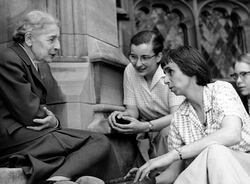Spiritual Direction
|
As a spiritual director, I meet with people who want to deepen their spiritual lives and practices through intentional sharing and listening. I am a graduate of the Spiritual Direction Program at the Haden Institute, North Carolina, which included work in the Jungian, Mystical, Dreams, and Christian Traditions.
I've written a few guest blogs for Abbey of the Arts, a global community that joins contemplative practice and the arts. These reflect my approach to aspects of spiritual life. Going on Faith explains some of my own philosophy about teaching, writing, and life. Who Needs A Church? talks about the importance of a church community in my spiritual life. It's All About the Listening is about my approach to downsizing and holding on to the "stuff" we have accumulated in life. Teaching and Facilitating I enjoy leading workshops and ongoing groups to encourage creativity, authentic voice, and reflecting on life stories. Contact me if you are interested in a workshop for yourself or your organization. Past workshops include:
What is Spiritual Direction? Spiritual Direction explores the meaning and direction of our lives through conversation about our deepest values and sense of connection to God. The term “God” is not essential to this conversation; any name -- spirit, light, universe, the holy, the divine, nature, the cosmos-- can be used. The term “direction” can be confusing too; the process does not “direct” one to change beliefs or religion, or even change life path. Some people use the term 'spiritual friend' or ' companion”; I like the Gaelic phrase “anam cara” or “soul friend,” perhaps due to my Irish ancestry. Is this a new process? Not at all! In the early Christian church, people sought counsel from the Desert Fathers, hermits who helped transform souls through an experience of deep contemplation and prayer. The process fell out of favor for several centuries but is enjoying a revival as we search for meaning in a world that feels more and more out of balance with what really matters. How do I know if Spiritual Direction is for me? Anyone with unanswered questions of the spirit, a longing for deeper meaning, who has been deeply touched by life events or who wants more than their current life offers, might find the process useful. Spiritual direction may be most helpful to those who currently feel cut off or distant from the sacred in life or from their religious tradition. What can I expect in a session? A spiritual director can ask questions and listen for answers that reveal the sacred in everyday life. We can help you to discern what action you may want to take in response. The conversation might involve: personal reflection about your spiritual journey; exploring spiritual practices such as meditation or centering prayer; using your dreams as a way to understand messages from the unconscious; or writing, journaling, collage, or other creative experiments. What religion are you? I was raised in the Roman Catholic tradition and have a great reverence for the rituals and roots of the Church. I was an active Unitarian Universalist for nearly 30 years and now attend a congregation that is part of the United Church of Christ. I am less into a belief structure and focused more on values and actions that respect humanity. As an active church member and leader I have learned to work with varied approaches to the life of the spirit. |

Attention is the rarest and purest form of generosity.
-- Simon Weil Practice listening - to your friends, your children, music in the wind, your dreams, the ancient wisdom of sacred texts. Listen as though your life depended on it. It does. -- Phil Cousineau The friend who can be silent with us in a moment of despair or confusion, who can stay with us in an hour of grief and bereavement, who can tolerate not knowing... not healing, not curing... that is a friend who cares. -- Henri Nouwen Mine is the mysticism of everyday life, of the heaped laundry and the bruised toe, of overcooked broccoli and leaves spangled with dew, of sunrise and sorrow, laughter and linguine, music and mold. This everyday mysticism requires no special powers, only imagination, a doting and practiced attention to the ordinary, a willingness to be surprised by grace. -- Philip Simmons, "Learning to Fall"
The road to the real self is a steep one. It goes up and down. -- Joan Chittister |
